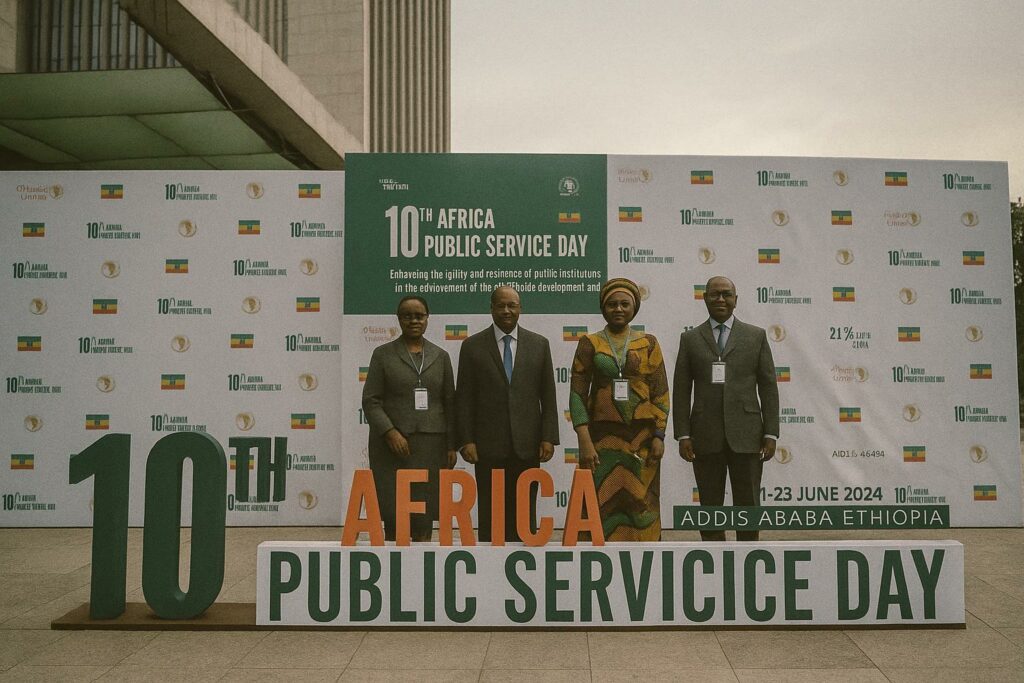A continental rendez-vous in Addis Ababa fuels governance scrutiny
The cavernous halls of the African Union Commission in Addis Ababa rarely lack diplomatic theatre, yet the 10th African Public Service Day offered a particularly revealing tableau. Delegations from thirty-two member states, together with representatives of the United Nations Department of Economic and Social Affairs and the African Development Bank, converged under the official theme of bolstering institutional “agility and resilience.” While the agenda echoed familiar multilateral rhetoric, the interventions acquired sharper texture against a post-pandemic backdrop that has laid bare chronic service-delivery gaps across the continent (African Union Secretariat, 2023).
Brazzaville’s biometric gamble captures the room
When Christian Aboké-Ndza, chief of staff to Congo’s Minister of Public Service, rose to address the plenary, the audience had already heard a litany of digital promises. His presentation nonetheless commanded attention, centred on two flagship initiatives: a nationwide biometric enrolment of state employees and an Integrated Human Resource Management System designed with technical assistance from the World Bank’s ID4D programme (World Bank, 2022). According to Aboké-Ndza, more than 85 % of civil servants have already been wp-signup.phped, pruning ‘ghost workers’ and releasing an estimated CFA 14 billion in fiscal space—figures subsequently corroborated by the International Monetary Fund’s Article IV consultation (IMF, 2023).
Digitalisation as diplomatic currency
Congo’s strategic packaging of domestic reforms for a continental audience illustrates an increasingly common diplomatic playbook. By showcasing technological modernisation, Brazzaville seeks not only efficiency but also reputational dividends within the African Union’s peer-review ecosystem. Similar manoeuvres have been observed in Kenya’s e-citizen platform and Rwanda’s Irembo portal, both frequently cited as normative benchmarks (UNECA, 2022). Aboké-Ndza leveraged this reputational currency to secure AU-funded training on compliance with the African Charter on the Values and Principles of Public Service—a subtle yet tangible gain in capacity-building resources.
Civil society inclusion: promise meets procedural reality
The Brazzaville envoy underscored the presence of national dialogue committees and consultative councils for women, youth and persons with disabilities. Domestic NGOs concede that these forums exist but caution that their advisory status limits policy traction. ‘Consultation without co-decision remains a polite monologue,’ argues Sylvie Mbemba of the Centre congolais pour la gouvernance (interview, 24 June). Nevertheless, the AU’s 2021 Barometer on Civic Space ranks Congo in the ‘cautiously improving’ category, a modest ascent that Addis participants regarded as evidence of incremental institutional opening.
Between fiscal prudence and data privacy anxieties
While donors applaud savings from payroll sanitation, privacy advocates warn that biometric centralisation, if unaccompanied by robust data-protection legislation, could morph into a surveillance architecture. Congo’s draft Personal Data Act, still before Parliament, draws partly on ECOWAS guidelines yet lacks an independent supervisory authority—an omission flagged by the Internet Society’s Africa bureau (2023). Aboké-Ndza conceded the gap, pledging expedited adoption ‘before the eleventh Public Service Day.’ Whether legislative calendars will oblige remains uncertain.
The road to the 2027 rendez-vous: stakes and scenarios
Addis Ababa will again host the eleventh edition in 2027, entrusting Ethiopia to curate progress reports on a theme likely to evolve toward artificial-intelligence governance, insiders suggest. For Congo, maintaining momentum will entail migrating legacy personnel files into the integrated platform, ratifying the data-protection bill and, crucially, converting fiscal gains into visible service improvements. Failure to translate digital dashboards into tangible citizen experience risks relegating Brazzaville’s current accolades to the realm of PowerPoint diplomacy.
A measured verdict from Addis
Delegates departed Addis with measured optimism. The Congolese case, emblematic of Africa’s digital turn, illustrates both the velocity and vulnerability of state modernisation drives. Biometric IDs and cloud-based HR systems can indeed prune leakages and widen access, yet they demand a parallel investment in legal safeguards and civic oversight. As one senior AU official quipped off-record, ‘Servers are resilient; institutions are not.’ The ensuing four years will test whether Brazzaville’s digital dreams solidify into resilient governance or dissipate in the haze of technocratic ambition.

